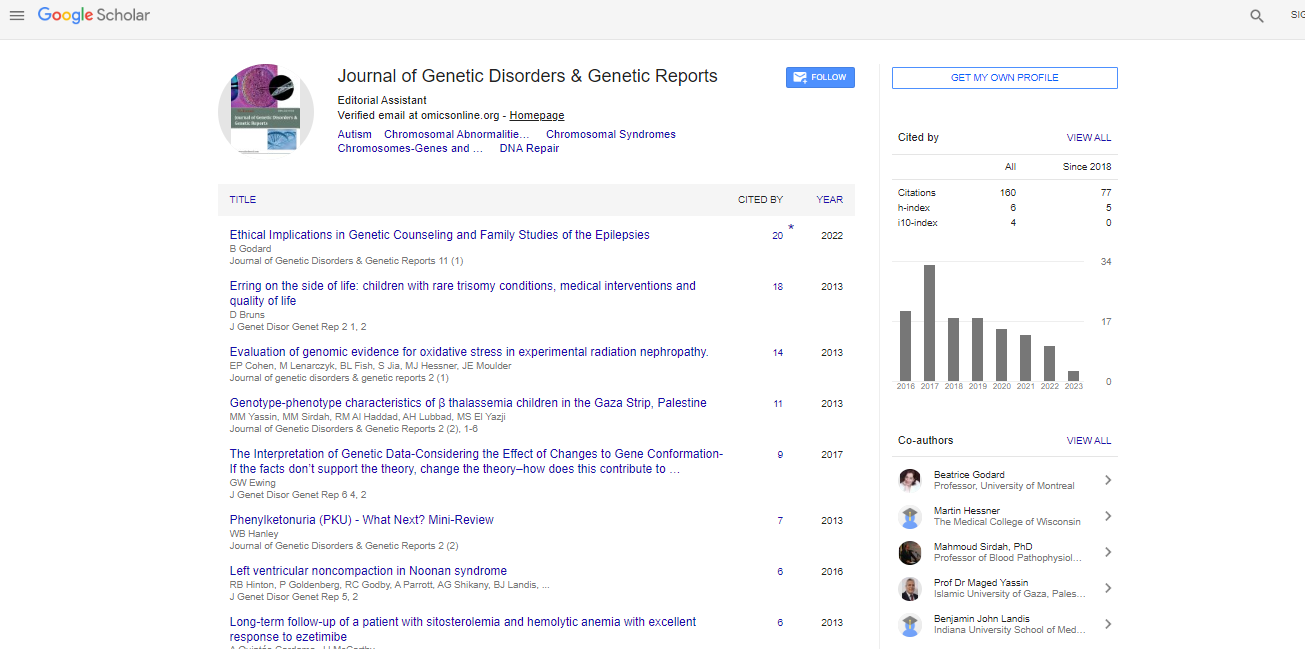Opinion Article, J Genet Disor Genet Rep Vol: 12 Issue: 3
Genetic Development: The Process Behind Evolution of Gene Regulation
Jenny Hacken*
1Department of Human Genetics, University of Miami, Miami, USA
*Corresponding Author: Jenny Hacken,
Department of Human Genetics, University of Miami, Miami, USA
E-mail: hackenjenny@gmail.com
Received date: 15 May, 2023, Manuscript No JGDGR-23-106033;
Editor assigned date: 17 May, 2023, PreQC No JGDGR-23-106033 (PQ);
Reviewed date: 01 June, 2023, QC No JGDGR-23-106033;
Revised date: 08 June, 2023, Manuscript No JGDGR-23-106033 (R);
Published date: 16 June, 2023, DOI: 10.4172/2576-1439.1000212
Citation: Hacken J (2023) Genetic Development: The process behind evolution of gene regulation. J Genet Disor Genet Rep 12:3.
Description
Genetic development is a fascinating and complex process that shapes every living organism, including humans. It involves the intricate interplay between genes and their environment, dictating the formation and functioning of an individual. Through a combination of inherited traits and environmental influences, genetic development plays a major role in determining physical attributes, behaviors, and susceptibility to diseases. The genetic information stored in Deoxyribonucleic Acid (DNA) is organized into functional units called genes. Genes contain the instructions for synthesizing proteins, which are the building blocks of cells and perform various functions within an organism. Gene expression involves the process of transcribing DNA into messenger RNA which is then translated into proteins.
Gene regulation plays a fundamental role in genetic development. It involves a complex network of interactions between various regulatory elements, such as enhancers, promoters, and repressors that control the activity of genes. At the heart of genetic development lies DNA the molecule that carries the genetic instructions for the development and functioning of all organisms. Genes are segments of DNA that contain specific instructions for synthesizing proteins, which are essential for carrying out various biological processes. In humans, each cell typically contains 46 chromosomes—23 pairs— comprising thousands of genes.
Inheritance and variation
Genetic development begins at conception, where a unique combination of genetic material from both parents is created.
Inheritance occurs through the transmission of genes from one generation to the next, leading to the perpetuation of certain traits and characteristics within families. However, genetic development also encompasses variation, as new combinations of genetic material occur due to genetic recombination and random mutations. This diversity is fundamental for adaptation and evolution.
Environmental influence on genes
Genetic development does not occur in isolation but is profoundly influenced by the environment. Environmental factors, such as nutrition, exposure to toxins, stress, and social interactions, can modify gene expression, shaping the trajectory of development. This phenomenon, known as epigenetics, highlights the dynamic nature of genetic development, where genes and environment constantly interact to determine outcomes.
Implications for human life
Understanding genetic development has immense implications for various aspects of human life. It provides insights into the origins of genetic disorders, enabling early diagnosis and intervention. Furthermore, it facilitates advancements in personalized medicine, allowing tailored treatments based on an individual's genetic profile. Additionally, the field of genetic engineering holds the potential to manipulate genetic development, offering possibilities for disease prevention, enhanced traits, and ethical dilemmas that warrant careful consideration.
Ethical considerations and future directions
As we unlock the mysteries of genetic development, ethical questions arise. Balancing scientific advancements with responsible practices is important to ensure equitable and ethical use of genetic information. Policies and guidelines must be in place to address concerns related to privacy, discrimination, and the potential misuse of genetic data. Moving forward, continued research and collaboration are vital to deepen our understanding of genetic development, expand its applications, and navigate the ethical challenges it presents.
Conclusion
Genetic development is a captivating process that shapes every living organism. Through the interplay between genes and the environment, it determines the physical and functional characteristics of individuals. By unraveling the intricacies of genetic development, we gain valuable insights into human health, disease, and our very existence. With responsible research and ethical considerations, we can harness the potential of genetic development to improve lives while ensuring a just and equitable future.
 Spanish
Spanish  Chinese
Chinese  Russian
Russian  German
German  French
French  Japanese
Japanese  Portuguese
Portuguese  Hindi
Hindi 



